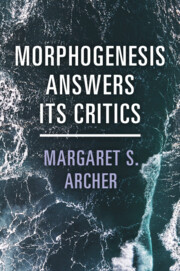
-
Select format
-
- Publisher:
- Cambridge University Press
- Publication date:
- March 2024
- April 2024
- ISBN:
- 9781009405430
- 9781009405416
- 9781009405454
- Dimensions:
- (229 x 152 mm)
- Weight & Pages:
- 0.49kg, 232 Pages
- Dimensions:
- (229 x 152 mm)
- Weight & Pages:
- 0.342kg, 232 Pages
- Subjects:
- Social Theory, Research Methods in Sociology and Criminology, Research Methods In Sociology and Criminology, Sociology
You may already have access via personal or institutional login- Subjects:
- Social Theory, Research Methods in Sociology and Criminology, Research Methods In Sociology and Criminology, Sociology
Book description
In this final book by renowned sociologist Margaret S. Archer, her groundbreaking morphogenetic approach is defended, refined and extended through a series of engagements with her critics. Archer, a pioneer of critical realism, addresses key debates surrounding her work on structure, agency, and social change. Each chapter responds to critiques from a different scholar, using these exchanges as springboards to further develop her powerful explanatory framework. Through these lively dialogues, Archer elaborates her tools for analysing social and cultural dynamics. This book offers readers a unique window into Archer's thought as she clarifies, sharpens and expands her theoretical contributions in response to constructive criticism. It will be an essential read for scholars and students across the social sciences, and for anyone seeking to understand the forces that shape our social world and how we can reshape it.
Reviews
‘Margaret Archer has created the most original sociological framework combining structure, culture and agency to help us account for social change as morphogenesis - change generating further change without moving in a single predefined direction. In Morphogenesis Answers Its Critics, she provides a reflexive view of how she made her way through the world of contemporary social sciences, controversy after controversy. It is both challenging and helpful for all narrow specialists (myself included) who try to rethink their practice in the context of contemporary challenges and transitions.’
Emmanuel Lazega - Professeur des universités, Institut Universitaire de France
‘For over two decades now, Margaret Archer's morphogenetic approach to social explanation has sparked great interest but also opposition from different quarters. In this spirited volume, Archer responds to each of her major critics, making for a lively engagement that advances the conversation for both critics and supporters of the morphogenetic approach. Thus, for all engaged in the approach, whether pro or con, this statement is must reading.'
Douglas Porpora - Professor of Sociology, Drexel University
Contents
Metrics
Full text views
Full text views help Loading metrics...
Loading metrics...
* Views captured on Cambridge Core between #date#. This data will be updated every 24 hours.
Usage data cannot currently be displayed.
Accessibility standard: Unknown
Why this information is here
This section outlines the accessibility features of this content - including support for screen readers, full keyboard navigation and high-contrast display options. This may not be relevant for you.
Accessibility Information
Accessibility compliance for the PDF of this book is currently unknown and may be updated in the future.


